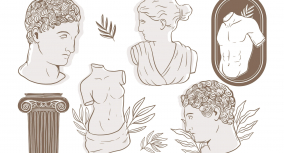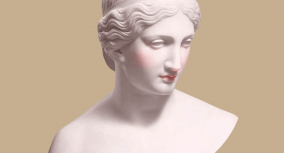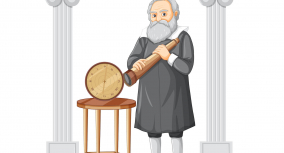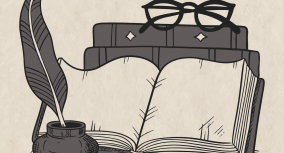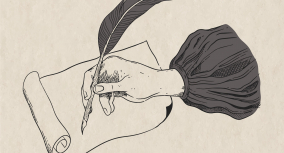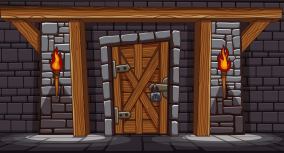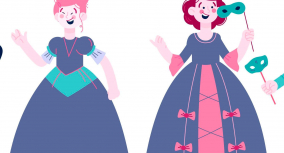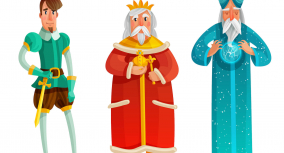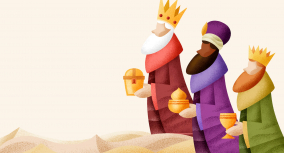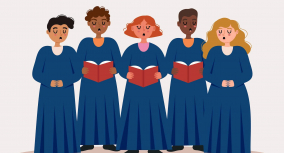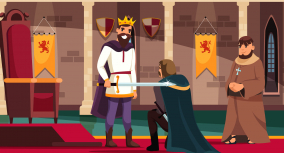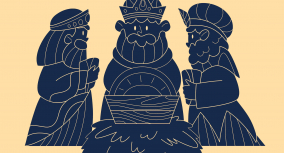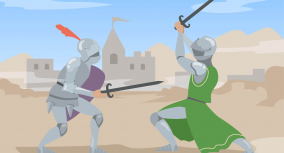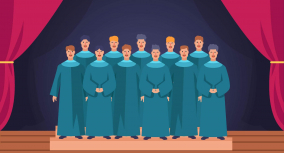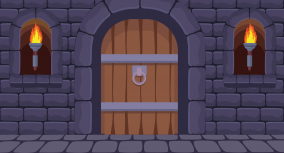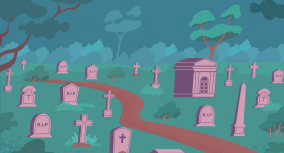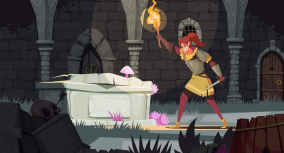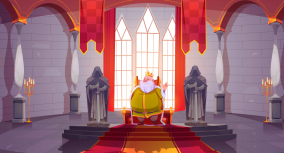Antigone‘s characters are fascinating and unusual for Greek tragedies, particularly the titular heroine. Her stubbornness, complexity, and autonomy set her apart from typical portraits of women of that time. In his article for Inquiry: An Interdisciplinary Journal of Philosophy, David McNeill notes that the play contains the first recorded instance of the word “autonomous,” a concept central to the understanding of the heroine’s personality and actions.
Below, Custom-Writing.org experts describe all major characters in Sophocles’ play: Creon, Antigone, Ismene, Tiresias, and others. In addition to the list of all players in Antigone, a character analysis is also provided for each of them. You will also find:
- An Antigone character map showing the main players and their relationships
- Antigone’s personality traits and what makes her an exceptional heroine
- Explanation of the Chorus and minor characters in Antigone
🗺️ Antigone Character Map
Below you’ll find Antigone character map. It contains all the key characters that appear in the play and illustrates their relationships.
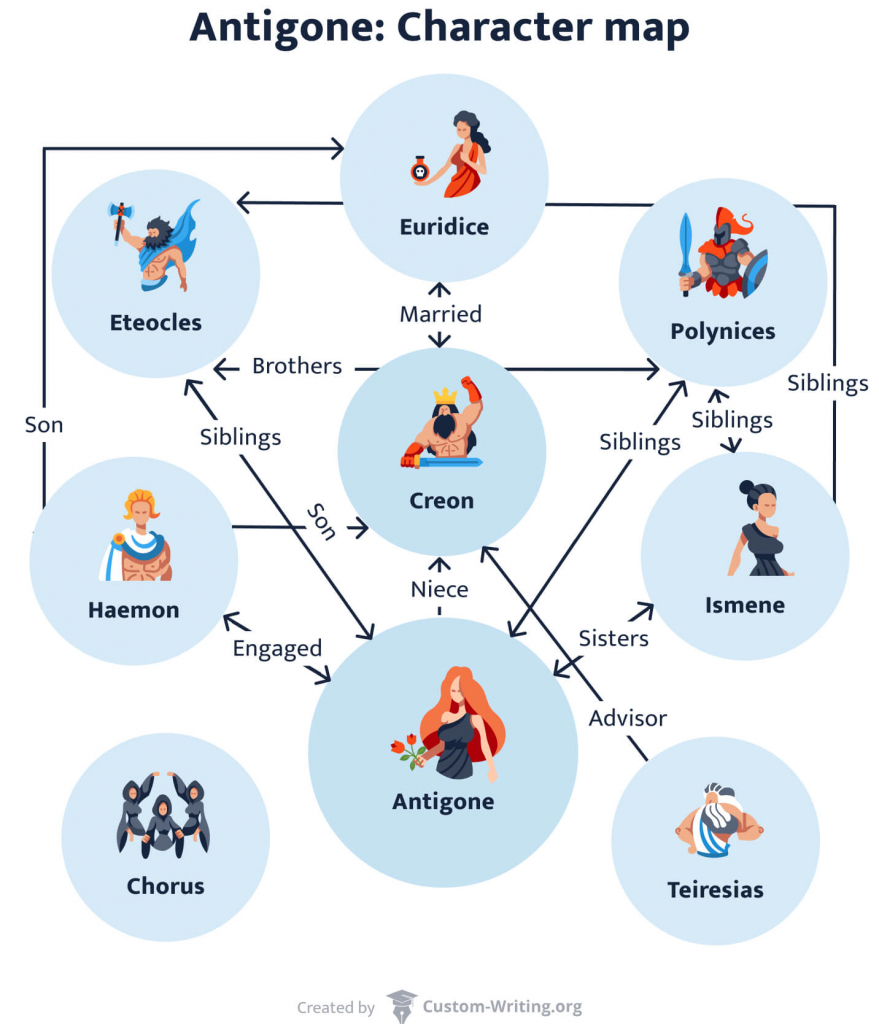
The main characters in Antigone are:
👩🦰 Antigone
Antigone is the main character in Sophocles’ play. She has many family relations with the other characters. Her decision to bury her brother, Polynices, triggered all the tragic events in the tragedy’s plot. Antigone went against the will of her uncle, Creon, and paid for it with her life. However, it was not the end of the tragedy.
Who Is Antigone?
According to Greek mythology, Antigone is the daughter of Oedipus. Sophocles wrote a play about her based on those myths following the events after the Theban War. Like many other masterpieces of Greek literature, her story carries a special meaning and a lesson for the readers.
Antigone Character Analysis
From the very beginning of the play, Antigone is described as the opposite of her sister Ismene. It is even reflected in their appearance.
Antigone looks more boyish, skinny, and generally not too attractive for men. Ismene, on the other hand, is quite beautiful and charming. Besides, their personalities are totally different as well. The main heroine appears to be extremely stubborn and needy. Her sister is much more obedient and sees going against men’s will as something inappropriate. The striking difference between the sisters highlights the theme of gender roles in Antigone.
During Antigone’s conflict with Creon, it is easy to see her position in the play. She never gives up on her desires. Therefore, even the threat of death cannot stop her from burying Polynices’ body according to traditions. However, Antigone’s character analysis shows that her persistence makes her character somewhat ugly and despicable. Even though the citizens are on her side, she still becomes an outcast as she goes against the law. On the other hand, there is a special kind of beauty in her tragic fate.
How Does Antigone Die?
Antigone dies tragically. After she buries the body of her brother, Polynices, Antigone’s uncle orders the guards to lock her inside the tomb alive. However, it is too late when the king realizes what a horrible mistake he made and comes to save her. He finds Antigone dead there.
Antigone’s Quotes
The quotes used in this section are taken from the translation by Ben Roy, Bliss Perry, Alejandro Quintana, Sam Puopolo, Benji Ho, and Sasha Barish.
That tortured corpse I still call Polyneices —
Antigone, Antigone, Prologue, Lines 28-30
He shall be left unwept, unburied, a sweet treasure
For the vultures as they search for the grace of flesh.
Leave me and my foolish plan
Antigone, Antigone, Prologue, Lines 95-97
To suffer our terrible fate!
There is no punishment horrible enough
To keep me from dying a beautiful death.
I didn’t think your decrees
Antigone, Antigone, Episode 2, Lines 453-455
Were strong enough to outweigh
The firm and unwritten laws of the gods.
Look at me, o citizens
Antigone, Antigone, Episode 4, Lines 806-810
Of my fatherland, as I set out
On my last journey, as I gaze upon
My last sunlight,
And never again.
If my husband had died, I could’ve found another,
Antigone, Antigone, Episode 4, Lines 909-912
And if I had lost my first child, another man could’ve fathered my second,
But with my mother and my father both sealed away in Hades,
I can never have a new brother.
🤴 King Creon
Creon is the new king of Thebes. He gets this title after his brother-in-law’s sons kill each other in the war. Creon is adamant that one of them is not worthy of a traditional burial ritual and forbids anyone to perform it. He wants to be a fair ruler, but in the end, he turns out to be wrong.
Who is Creon in Antigone?
In Sophocles’ play, Creon appears to have the same position as the in myth. As a king of Thebes, he has the right to punish anyone who goes against his will. It happens to his niece, Antigone, who puts tradition and the gods above the man’s wish and buries the traitor’s body.
Creon Character Analysis
Creon is portrayed as a strict and practical man. He is not bound to all the feelings related to the death of Oedipus and his sons. As soon as Creon steps on the throne, he focuses on saving the political order in Thebes. The law is what matters and keeps things together, so he cannot spare Antigone’s life. Even though she could potentially become a mother to his heir, she had to cover up her crime.
However, this attitude and Antigone’s stubbornness ruined his whole family. In the end, King Creon pays for his decision at a high price and suffers in loneliness.
Creon’s Quotes from Antigone
Be my witness, all-seeing Zeus:
Antigone, Creon, Episode 1, Lines 184-186
I would never stay silent if I saw trouble
Threatening the safety of our society.
You, sitting in the palace like a viper, lurking,
Antigone, Creon, Episode 2, Lines 531-534
Sucking my blood dry while you went unnoticed—did I miss some sign
When I raised you two leeches, some sign that you’d be
Rebels against the throne?
Ah me! Ah me! For all my crimes
Antigone, Creon, Exodus, Lines 1317-1320
This suffering will never fix itself upon another!
Oh I killed you, I did! Oh miserable one!
I’m telling the truth!
👧 Ismene
In Greek mythology, Ismene is another daughter of Oedipus. When her sister, Antigone, wants to bury their brother’s body against the will of Creon, Ismene refuses to help. She is entirely devoted to the laws and the king, so she tries to talk her sister out of becoming a rebel. However, she finally lets Antigone go.
Go on then, if you think it best—you’re a fool
Antigone, Ismene, Prologue, Lines 98-99
To go, but your loved ones still love you.
Who is Ismene in Antigone?
In Antigone, Ismene is Antigone’s sister. However, despite the blood relation, she stays loyal to the order and does not agree to help her sister break the law. However, in the end, Ismene changes her mind and asks Creon to punish her as well. It shows how persuasive Antigone can be.
Ismene Character Traits
Ismene is shown as an incredible beauty. Unlike her sister, she is outgoing and seems to be the good girl in their family. Ismene always follows the rules even when relatives are involved. She knows her place and would never go against men’s will. However, Antigone manages to touch her heart.
Which Archetype Does Ismene Best Represent?
It would be safe to say that Ismene represents loyalty. In the play, she remains on the side of Creon’s order. She respects her country and the laws that are established there. When she chooses between her sister and her uncle’s rules, she prefers not to become an outcast and refuses to help Antigone.
👨🦳 Tiresias
According to Greek mythology, Tiresias is a blind prophet in Thebes. He is famous for his transformation into a woman as well. He comes to Creon to warn him about the gods’ will in an attempt to talk him out of his decision.
When a man does wrong, if he makes amends
Antigone, Tiresias, Episode 5, Lines 1025-1028
And moves forward after his mistake,
He is no longer unwise or unblessed—
But your stubbornness has made you clumsy!
Even though his words are hard to believe and his predictions are horrifying, he stands for his words. There are no compromises. Tiresias is devoted to the truth. It may even seem like the prophet is one of the most powerful characters of Antigone. Creon rejects his predictions and even threatens him, but it is not the first time Tiresias faces insults. He knows that he has the gods’ protection.
🎶 The Chorus
The Chorus is represented in the play as a narrative side. The prologue and epilogue are given by the Chorus in Antigone as well. Those comments, which appear during the turning points, create a tragic atmosphere since they reference historical moments, moral values, and the key themes of the play.
Destiny has a certain terrible power:
Antigone, Chorus, Stasimon 4, Lines 51-54
Nothing—neither wealth, nor Ares,
Nor lofty heights, nor dark sea-tossed ships—
Can ward off its grasp.
Throughout the play, the chants and songs show the right direction for the audience. Sophocles enforces a certain kind of perspective through them. The leader of the Chorus in Antigone even tries to interfere with the event a few times. One of those scenes is when Creon finally changes his mind and rushes to save Antigone.
🎭 Minor Characters
Eurydice
In Antigone, Eurydice is Creon’s wife. The only thing she has been doing is knitting in her room. She gets desperate when she finds out the news about Haemon’s death. The queen blames her husband for everything that happened. However, he cannot carry her grief for too long. Eurydice decides to take her own life.
At the altar, with a sharp-edged sword,
Antigone, Messenger, Exodus, Lines 1301-1302, 1304-1305
She hacked until her black eyes shut…
And with her last breath she sang
Curses upon you as a child-killer.
Haemon
Haemon, Antigone’s future husband and Creon’s son, has a hard time accepting his father’s decision. He tries to talk the king out of this idea and spare Antigone’s life since even the people do not support it. In the end, when Haemon sees his fiancé’s dead body, he goes so mad that he tries to kill Creon but ends up committing suicide.
Polynices
Polynices does not appear as a living character in Antigone. He was one of the sons of Oedipus and wanted to take the throne. Polynices tried to win Thebes with force but ended up losing. He and his brother, Eteocles, killed each other in that war. However, considered a traitor, Polynices was not supposed to be buried.
Eteocles
Eteocles was another son of Oedipus. He was on the throne when his brother, Polynices, decided to take his place. Eteocles protected Thebes and won the war, but he lost his life. As a result, both brothers were dead. However, since the king took Eteocles’ side, he allowed a traditional burial for him.
Thank you for reading this article! You might also want to take a look at Antigone essay topics collection. Another great option is using our topic-generating tool. Any questions left? Check the QA section!
